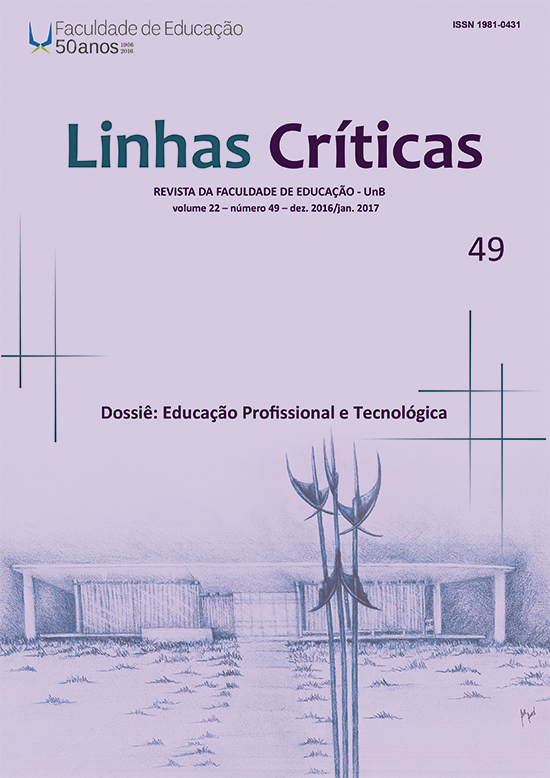Epistemological and pedagogical aspects of professional and technological education: implications for teaching practice
DOI:
https://doi.org/10.26512/lc.v22i49.4948Keywords:
Professional and technological education, Epistemology of technical and professional disciplines, Challenges of teacher educationAbstract
The unprecedented expansion in professional and technological education in recent decades has not been accompanied by sufficient training teacher courses. Thousands of professional have worked in this area, without any previous debate about vocational education characteristics and its implications for teaching practice. There is a consensus about the lack of specific teacher training, particularly for those who work in technical or professional subjects. This article focuses on two fundamental challenges: the discussion about epistemology and the pedagogy underlying the technical or professional disciplines; and the necessary confrontation of changes in the world of work.
Downloads
References
BROUGÈRE, Gilles; ULMANN, Anne-Lise (orgs.). Aprender pela vida cotidiana. Campinas: Autores Associados, 2012.
CARVALHO, Olgamir Francisco.; LACERDA, Gilberto. Dualismo versus congruência: diálogo entre o novo modelo brasileiro para a formação profissional e o modelo didático ESC (Experiencial, Científico e Construtivista). In: MOLL, Jaqueline (Org.). Educação profissional e tecnológica no Brasil contemporâneo: desafios, tensões e possibilidades. Porto Alegre: Artmed, 2010.
CARVALHO, Olgamir Francisco; SILVA, Caetana Juracy Rezende; Araújo, Mariângela. Educação Profissional e Tecnológica: elementos históricos e conceituais In: Educação Profissional e Tecnológica: elementos históricos e conceituais. Brasília: Editora UnB, 2016, p. 306 - 344.
CARVALHO, Olgamir Francisco; SOUZA, Francisco Heitor Magalhães. Formação do docente da Educação Profissional e Tecnológica no Brasil: um diálogo com as Faculdades de Educação e o Curso de Pedagogia: Educação e Sociedade, Set 2014, vol. 35, Nº 128, p. 883-908. ISSN 0101-7330
CATTANI, Alberto David; RIBEIRO, Jorge Alberto Rosa. Formação profissional. In: CATTANI, Alberto David; HOLZMANN, Lorena (Org.). Dicionário de trabalho e tecnologia. 2a ed. revista e ampliada Porto Alegre: Zouk, 2011. p. 203-209.
FERREIRA, Mário César. Qualidade de vida no trabalho: Uma abordagem centrada no olhar dos trabalhadores. 2a ed. Brasília, DF: Paralelo 15, 2012.
GAGNON, Richard. Epistemología de las disciplinas profesionales y técnicas. In: Linhas Críticas, Brasília, DF, v.16, n. 30, jan./jun. 2010. p. 5-26.
GUÉRIN, François et al. Compreender o trabalho para transformá-lo: A prática da ergonomia. São Paulo: Blücher, 2001.
INSTITUTO NACIONAL DE ESTUDOS E PESQUISAS EDUCACIONAIS ANÃSIO TEIXEIRA. Sinopses Estatísticas da Educação Básica 2005 a 2015. Brasília: Inep, 2007, 2008, 2009, 2010, 2011, 2012, 2013, 2014, 2015, 2016, 2017. Disponíveis em: <http://portal.inep.gov.br/web/guest/sinopses-estatisticas-da-educacao-basica>.
___________. Sinopses estatísticas da educação superior 2015 ”“ graduação. Brasília: Inep, 2016. Disponível em: < http:// portal.inep.gov.br/web/guest/sinopses-estatisticas-da-educacao-superior>.
KOLB, David A.Experiential learning: Experience as the source of learning and development. New Jersey: Prentice-Hall, 1984.
MACHADO, Lucília. Diferenciais inovadores na formação de professores para a educação profissional. Revista Brasileira da Educação Profissional e Tecnológica, Brasília, v. 1, nº 1, 2008.
POLANYI, Michael. Personal Knowledge ”“ Towards a Post-Critical Philosophy. London: Routkedge, 2005.
SILVA, Caetana Juracy Rezende. Do saber ao sabor: estudo da relação entre saberes tácitos e explícitos expressos nas competências laborais de cozinheiros em situação de trabalho. Doutorado em Educação. Brasília: UnB, 2016.
Downloads
Published
How to Cite
Issue
Section
License
Copyright (c) 2017 Linhas Críticas

This work is licensed under a Creative Commons Attribution 4.0 International License.
Authors who publish in this journal agree to the following terms:
-Authors maintains the copyright and grants the journal the right of first publication, the work being simultaneously licensed under the Creative Commons Attribution License which allows the sharing of the work with recognition of the authorship of the work and initial publication in this journal.
- Authors are authorized to enter into additional contracts separately, for non-exclusive distribution of the version of the work published in this journal (eg publish in institutional repository or as a book chapter), with acknowledgment of authorship and initial publication in this journal.
-Authorers are allowed and encouraged to publish and distribute their work online (eg in institutional repositories or on their personal page) at any point before or during the editorial process, as this can generate productive changes as well as increase the impact and the citation of published work (See The Effect of Free Access).



